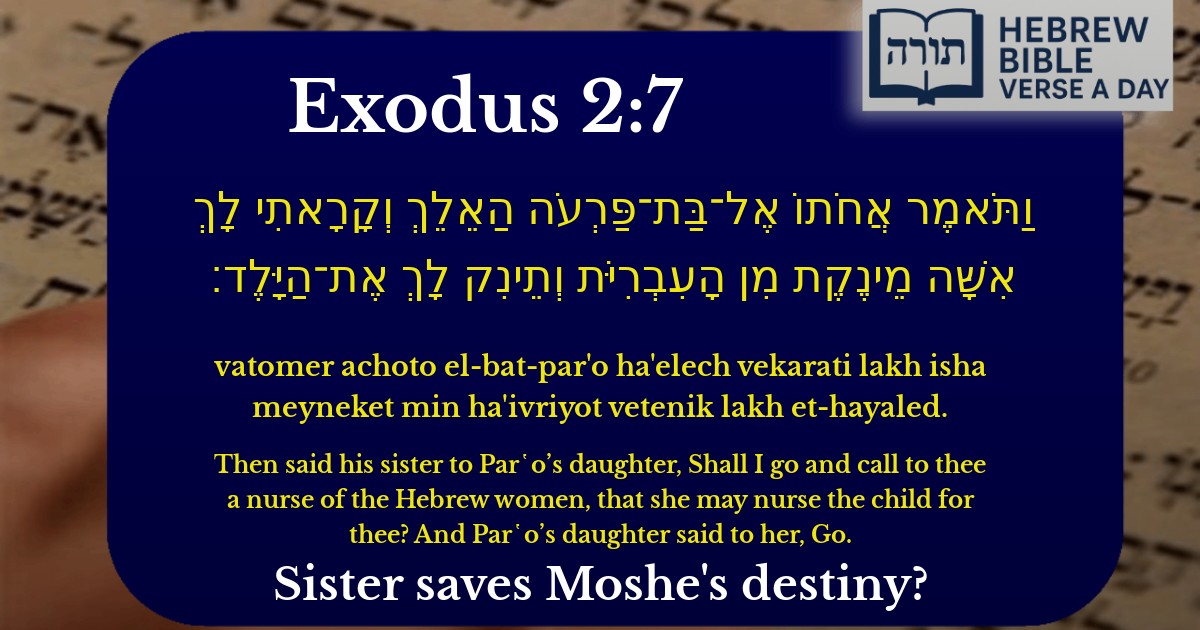Join Our Newsletter To Be Informed When New Videos Are Posted
Join the thousands of fellow Studends who rely on our videos to learn how to read the bible in Hebrew for free!
Hebrew Text
וַתֹּאמֶר אֲחֹתוֹ אֶל־בַּת־פַּרְעֹה הַאֵלֵךְ וְקָרָאתִי לָךְ אִשָּׁה מֵינֶקֶת מִן הָעִבְרִיֹּת וְתֵינִק לָךְ אֶת־הַיָּלֶד׃
English Translation
Then said his sister to Par῾o’s daughter, Shall I go and call to thee a nurse of the Hebrew women, that she may nurse the child for thee? And Par῾o’s daughter said to her, Go.
Transliteration
Vatomer achoto el-bat-par'o ha'elech vekarati lakh isha meyneket min ha'ivriyot vetenik lakh et-hayaled.
Hebrew Leining Text
וַתֹּ֣אמֶר אֲחֹתוֹ֮ אֶל־בַּת־פַּרְעֹה֒ הַאֵלֵ֗ךְ וְקָרָ֤אתִי לָךְ֙ אִשָּׁ֣ה מֵינֶ֔קֶת מִ֖ן הָעִבְרִיֹּ֑ת וְתֵינִ֥ק לָ֖ךְ אֶת־הַיָּֽלֶד׃
וַתֹּ֣אמֶר אֲחֹתוֹ֮ אֶל־בַּת־פַּרְעֹה֒ הַאֵלֵ֗ךְ וְקָרָ֤אתִי לָךְ֙ אִשָּׁ֣ה מֵינֶ֔קֶת מִ֖ן הָעִבְרִיֹּ֑ת וְתֵינִ֥ק לָ֖ךְ אֶת־הַיָּֽלֶד׃
🎵 Listen to leining
Parasha Commentary
📚 Talmud Citations
This verse is quoted in the Talmud.
📖 Sotah 12b
The verse is discussed in the context of Miriam's wisdom and quick thinking in suggesting her mother as a nurse for Moses.


The Role of Miriam in Moshe's Salvation
The verse describes Miriam, Moshe's sister, approaching Pharaoh's daughter with a suggestion to find a Hebrew wet nurse for the infant Moshe. Rashi (Shemot 2:7) explains that Miriam demonstrated wisdom by phrasing her suggestion as a question ("Shall I go...") rather than a command, showing respect to royalty. This reflects the principle of derech eretz (proper conduct) even in urgent situations.
Miriam's Strategic Intervention
The Midrash (Shemot Rabbah 1:25) elaborates that Miriam waited nearby to see what would happen to her brother, demonstrating her deep concern. When Pharaoh's daughter found Moshe, Miriam seized the opportunity to ensure he would be nursed by his own mother, Yocheved. The Talmud (Sotah 12b) notes that Miriam's words were carefully chosen—she said "from the Hebrew women" rather than specifying her mother, allowing for this reunion while maintaining discretion.
Divine Providence in the Narrative
Rambam (Hilchos Yesodei HaTorah 8:1) would later discuss how this episode demonstrates hashgacha pratit (divine providence), where Hashem orchestrates events to fulfill His plan. The Maharal (Gevuros Hashem ch. 14) explains that Miriam's presence at this critical moment was no coincidence, but part of the divine plan to preserve Moshe, the future redeemer of Israel.
The Significance of Nursing from a Hebrew Woman